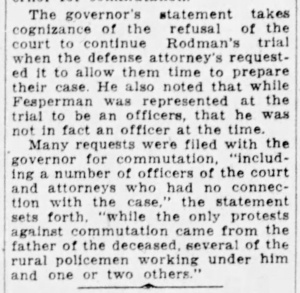Fesperman has been chief of Rural Police ...
Vic Fesperman, in charge of the McDaniel investigation in 1929, was a deputy sheriff in February 1924 when his 21-year-old son, John, was fatally shot while on what was first described as a “raid” with Rural Police officers.
Alex Rodman, a Black man of about 20 (records disagree), was soon said to have confessed and was quickly convicted of first-degree murder in Mecklenburg Superior Court, then sentenced to the electric chair. It was reported at the time, and claimed in Rodman’s trial, that John Fesperman was shot while holding Rodman in custody as “brother officers” questioned others at a house out Providence Road. Another story referred to the raid as Rural Police officers quieting “disorderly negroes.”
But in June 1925, Gov. Angus Wilton McLean commuted Rodman’s sentence, on remarkable grounds. The Raleigh News & Observer quoted his statement that:

- “The deceased, John Fesperman, who was represented at the trial to have been an officer at the time he was killed, was not in fact an officer at that time.”
- The only officer (of the three who’d been there) called to testify at Rodman’s trial was Howard Wilson, “brother-in-law of the deceased.”
- There was no evidence the officers had a warrant to enter the property, “or that any crime was being committed in their presence” at the gathering — now being called “a negro fish fry.”
- Nor was there any evidence that Rodman was breaking any law when the officers threw him — and others — out the back door of the house.
- The court had refused to grant the requests of Rodman’s attorneys for more time to prepare his case and for a change of venue. (Notably, solicitor John Carpenter argued against any delays, the Observer wrote, because they “tend to bring into play the ‘lynch law’ ” — while Rodman’s attorney, F.B. Helms, said newspaper stories had already formed public opinion on the case, and if Rodman were convicted now, “it will be by the mob, essentially.”)
- The governor also stated he’d seen “evidence not produced at the trial,” leading to his decision. (He did not elaborate and commutation records are sealed for 100 years. They will be available in 2025.)
Officers of the court, citizens and attorneys with no connection to the case — including “more than one hundred of the best people of Mecklenburg County,” the governor’s statement said — also requested Rodman’s sentence be commuted. The only people against it, according to the Observer, were Vic Fesperman, several officers who worked for him, “and one or two others.”
McLean did not pardon Rodman; he commuted his sentence to life imprisonment.
Rodman would eventually be paroled – in 1942.
In 2005, John Fesperman’s name was added to the National Law Enforcement Officers Memorial in Washington, to honor officers killed in the line of duty, where it remains. What happened is described this way on the memorial’s website:
“Officer Fesperman and his fellow officers were conducting a liquor raid at a local residence. Officer Fesperman was left with the suspect as the other officers searched the rest of the property. The suspect retrieved a hidden revolver and shot Officer Fesperman once in the head, killing him. The suspect was found guilty in a court of law and sentenced to death.”
The Charlotte-Mecklenburg Police Department lists John Fesperman as a “fallen officer” on its website, and his name is engraved on the CMPD Fallen Officer Memorial on East Trade Street.
— HS
Learn more about racial injustice, and what happened to Joe McNeely and Willie McDaniel here in Charlotte-Mecklenburg, by exploring the rest of this website and EJI’s resources


